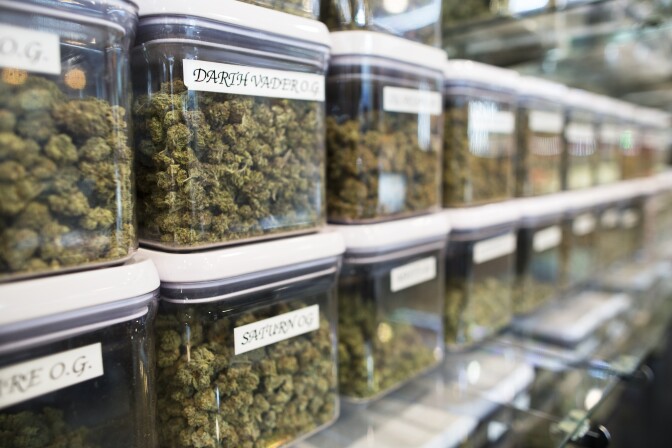This story is free to read because readers choose to support LAist. If you find value in independent local reporting, make a donation to power our newsroom today.
This archival content was originally written for and published on KPCC.org. Keep in mind that links and images may no longer work — and references may be outdated.
LA City Council approves rules for recreational pot

Just weeks away from the statewide legalization of recreational marijuana, the Los Angeles City Council voted Wednesday to adopt regulations for businesses planning to grow, distribute and sell pot to consumers starting in the new year.
"Today is the moment to set the tone for the rest of the country," said council President Herb Wesson. "We are a big city. We do big stuff."
The vote — 12-0 with three members absent — offers some long-awaited clarity to businesses that will need to obtain local licenses before applying for approval from the state.
Medical marijuana dispensaries that have been compliant with Proposition D, passed by L.A. voters in 2013, will receive top priority in the license application process. Growers who have been supplying these shops can receive temporary approval as they start to seek licenses.
Retail shops in Los Angeles will not be allowed within 750 feet of schools, daycare centers, public parks, libraries, drug and alcohol recovery centers or permanent supportive housing. Non-retail businesses, like growers and manufacturers, will be required to be at least 600 feet from schools.
Pot shops will not be allowed to provide free cannabis samples, sell alcohol or tobacco or provide musical entertainment on site. They will be required to electronically verify that their customers are 21 or older.
City staffers said the regulations remain a work in progress. Council members disagreed on the provision preventing pot businesses from locating near daycare centers. And at some point the council may consider whether to allow people to consume marijuana inside certain businesses.
Councilmembers Nury Martinez, who represents the northeast San Fernando Valley, and Jose Huizar, whose district includes downtown and Boyle Heights, voiced concern about the potential concentration of marijuana businesses in their communities.
"We need to ensure our communities, particularly low-income and communities of color, are not negatively impacted by this industry," Martinez said.
Marijuana industry consultant Adam Spiker is worried that efforts to limit the number of pot-related businesses in certain areas could cause dispensaries struggling to keep up with new demand to buy from unlicensed suppliers.
"The demand for the product — which is immense in the city of L.A., whether people like it or not — if it's not met through regulated channels, it's just fuel for the illicit market," Spiker said.
Councilman Joe Buscaino said he wanted to maintain local control over pot businesses' hours of operation, rather than deferring to the state-set hours of 6 a.m. to 10 p.m. Councilman Bob Blumenfield pushed to take cash transactions out of the marijuana industry.
"We have lots of conversations to have moving forward," said Cat Packer, director of the city's Department of Cannabis Regulation.
Virgil Grant, president of the Southern California Coalition, a marijuana industry advocacy group, applauded the council's commitment to creating a "social equity" program, which will aim to ensure that residents from communities with a disproportionate number of cannabis arrests can now benefit from the commercialization of pot.
Grant commended councilmen Herb Wesson and Marqueece Harris-Dawson for speaking about how African-Americans were treated during the war on drugs.
"Coming from our backgrounds and our history, we totally understand why moving forward in the way we are is a great thing, not just for Los Angeles but for the country," Grant said.
A few council members suggested changes to the rules governing the social equity program, which will rank business license applicants based on the neighborhoods where they've lived and whether they've had minor cannabis convictions in the past.








